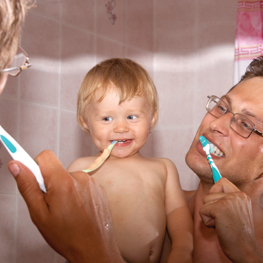
The latest research indicates healthy child development hinges in part on healthy teeth. It’s time we made better dental care a national public health priority. Quick quiz: What’s the No. 1 chronic infectious disease in North America for children ages five and younger? If you answered measles, chicken pox, strep throat or flu, you’d be close but wrong. The correct answer is Early Childhood Caries (ECC).
You probably know it as dental cavities. That’s right; a tooth cavity is a contagious disease – a dangerous, costly and destructive one. The U.S. Surgeon General calls ECC a “silent epidemic.” The U.S. National Center for Health Statistics reports that ECC afflicts 28 per cent of North American children between ages two and five – about 5 million kids.
The prevailing myth portrays ECC as relatively harmless. The disease targets baby teeth, which are naturally replaced by adult teeth. Why spend time or money on them? One reason is ECC’s ripple effects on our healthcare system. For example, according to the Canadian Dental Association, ECC-related dental surgery under general anesthesia is the single most common surgical procedure at most pediatric hospitals in Canada.
More compelling, however, is the profound effect on the children who suffer from the disease. Approximately 1.2 million of them never receive treatment. They are in constant and severe pain. They don’t eat or sleep properly. Many are malnourished, suffering iron and protein deficiencies that delay motor and mental development, and weaken the immune system.
As a dental professional, I’m just as concerned about the emotional and psychological effects of chronic pain. When treatment is delayed or denied, children with ECC endure toxic stress, which is the experience of powerful, frequent or prolonged suffering. Toxic stress dramatically alters brain development in children. It’s been linked to addiction, poor impulse control, mood control problems, anxiety disorders, learning disabilities and impaired memory. Some researchers believe this profound level of stress is equivalent to recurrent abuse and chronic neglect, which leads in adult life to significantly higher rates of obesity, type 2 diabetes, cardiovascular disease, hypertension, addictive behaviors and suicide.
Prevention
The cost of treating ECC grows higher the longer it’s delayed. Yet prevention is simple and inexpensive – and begins before birth.
A baby’s teeth start to form just seven weeks into pregnancy. To help these teeth develop properly, pregnant mothers must be sure to get enough vitamin D. Foods such as milk, eggs and fish are good sources. So is sunlight but it’s in short supply during long Canadian winters. Talk to your doctor to determine if vitamin supplements are necessary.
Wipe your newborn’s gums with a clean, wet cloth immediately after feeding. As soon as teeth begin to emerge, clean all surfaces with a baby-sized toothbrush and a smear of toothpaste. Recognizing the gravity of ECC, dental associations in both Canada and the U.S. recommend first dental visits between six and 12 months of age. Unfortunately, many dentists still refuse to see patients before age three.
If this is your dentist’s position, find another dentist. Early intervention is essential not only to detect and treat ECC, but also to help children get comfortable with oral care practices - and to help parents learn proper dental care techniques.
In Canada, we need to do a great deal more to counter what should be a national public health priority. Western healthcare has evolved to assign the treatment of teeth to dentists and the treatment of the rest of the body to physicians. Like a cavity between molars, ECC has thrived in this disciplinary divide. Greater awareness of the disease – particularly among new parents - will help close this gap and relieve the suffering of millions of children everywhere.
With more than 40 years of experience as a pediatric dentist, Dr. Leonard Smith is Chairman and CEO of The Society for a Healthy Mouth, Healthy Child (Alberta) and The Foundation for a Healthy Mouth, Healthy Child (U.S.). He is also a Diplomate of the American Board of Pediatric Dentistry, and Clinical Assistant Professor, Department of Pediatrics, University of Calgary Faculty of Medicine. For more information, contact Dr. Smith at This email address is being protected from spambots. You need JavaScript enabled to view it. or visit www.dentalcareforchildren.ca
Calgary’s Child Magazine © 2024 Calgary’s Child